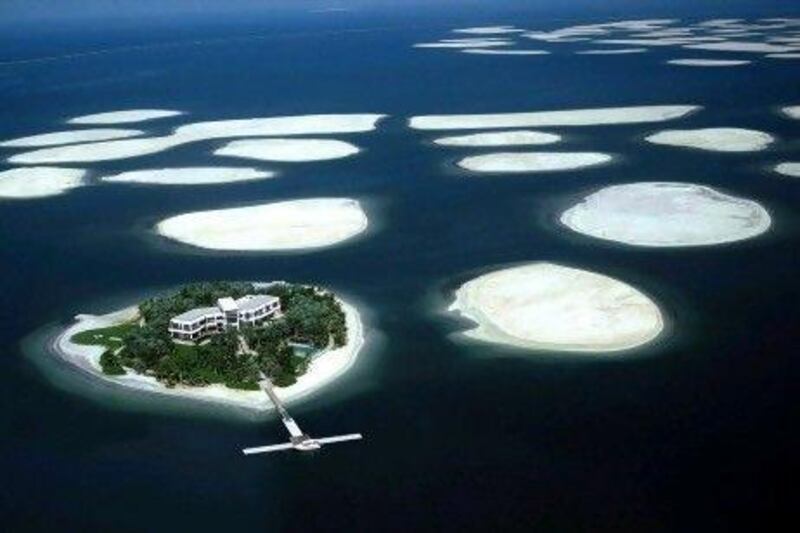Europe's debt crisis has dominated global financial news for most of this year. In the UAE, however, high levels of debt at Dubai's government-linked companies were among the country's most pressing economic concerns.
Dubai's debt woes emerged more than two years ago, when Dubai World, a government-owned conglomerate that holds some of the emirate's biggest companies, announced it would seek a standstill on debt repayments as the global financial crisis cut off financing lifelines.
What ensued at Dubai World, which once owned Nakheel, developer of The World, and still owns the global ports operator DP World, was an excruciating saga of negotiations to restructure loans and other debttotalling about US$25 billion (Dh91.83bn).
After many months of talks, Dubai World and its creditors finalised the deal early this year.
With the backing of the Dubai Financial Support Fund, created in 2009 to manage and distribute the proceeds of a $20bn financing package from the Abu Dhabi Government and the Central Bank, Dubai appeared poised to move quietly beyond its spate of bad news and thorny debt issues.
Late this year, however, analysts began to sound the alarm again about Dubai and its upcoming debt repayments. Many were sceptical about the emirate's ability to refinance billions of dollars of debt coming due next year during a global economic slump.
The European financial crisis - not to mention trouble in the rest of the world's big economies - has dampened sentiment and left banks and investors less willing to refinance loans or buy new debt.
The five Dubai Government-linked companies covered by the credit ratings agency Standard & Poor's (S&P) "are up against significant risks from the weakening global economic outlook, the Arab Spring, and the volatile equity and bond markets", S&P analysts said in a note this week. "These risks have raised concerns as [government-related companies] face large debt maturities and refinancing needs in 2012."
Most observers agree that Dubai's refinancing needs next year are large. The IMF, Bank of America Merrill Lynch, the ratings agencies and other analysts highlight repayments or refinancings of about $15bn next year. The emirate's total debt load after the Dubai World restructuring is $119.8bn, according to a Merrill report.
Among the largest debts maturing next year in Dubai are the Jebel Ali Free Zone's $2bn Islamic bond, which is due in November, and a $1.25bn sukuk from DIFC Investments that must be repaid in June.
Few analysts have suggested that Dubai's borrowings will not be repaid, or even that they might be restructured, sending the emirate into yet more negotiations with banks and other creditors.
Government officials have denied that restructuring is on the table, and such a scenario is clearly something Dubai wants to avoid, if for no other reason than the repercussions that this could have on financially stable government-owned companies.
"While a restructuring could help some of the weaker companies obtain more sustainable capital structures, the impact on the rest of the Dubai Inc structure will make it difficult to envisage a default without serious repercussions on the cost of debt to the various other healthy corporates in need of market access," Jean-Michel Saliba, an economist at the Bank of America Merrill Lynch, said in a note this month.
The more likely yet still worrying scenario, analysts say, is that some government-linked companies may not be able to refinance, given banks' and investors' reluctance to lend. And that could mean they would need state aid to repay debts in full and on time.
"Even the strongest names are finding access to the capital markets to be patchy, so that adds execution risk to any refinancing initiative," David Staples, the managing director for GCC corporate ratings at Moody's Investors Service, told The National this month. "On top of that, banks are already more cautious and more conservative in their credit standards after the last downturn."
In its note this week, S&P went so far as to say DIFC Investments, the investment arm of Dubai's financial free zone, and the Jebel Ali Free Zone, the business district around the emirate's largest port, "will likely struggle to refinance without some form of government support".
But as worry intensifies about Dubai's refinancing schedule, the emirate and its business empire - a wide-ranging group of companies that flourished during the boom but fell on hard times after the financial crisis - are still in the midst of restructuring some of their obligations.
Limitless, a property developer owned by Dubai World but excluded from the restructuring completed this year, joins Drydocks World, Zabeel Investments and divisions of Dubai Holding among the list of Dubai corporates negotiating new terms on debt.
Dubai's unprecedented struggles with debt have already spurred reforms. Debt management offices have been created at emirate and federal levels to improve the coordination of bank loans and bonds of state-owned enterprises. Their job is to contain borrowings before they get out of hand.
The Federal National Council in 2009 approved a draft public debt law that put caps on federal-level borrowing, paving the way for a government debt strategy coordinated from the top.
More changes may be in store if Dubai's debt problems bubble up again next year, a scenario government officials have done their best to portray as far-fetched.
twitter: Follow our breaking business news and retweet to your followers. Follow us





